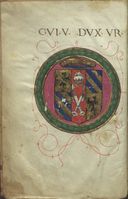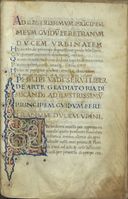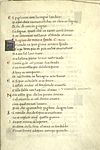|
|
You are not currently logged in. Are you accessing the unsecure (http) portal? Click here to switch to the secure portal. |
Difference between revisions of "De Arte Gladiatoria Dimicandi (MS Vitt.Em.1324)"
| Line 1: | Line 1: | ||
| − | {{ | + | {{infobox manuscript |
<!----------Name----------> | <!----------Name----------> | ||
| name = [[name::De Arte Gladiatoria Dimicandi]] | | name = [[name::De Arte Gladiatoria Dimicandi]] | ||
| − | | location = [[inventory::Vitt.Em.1324]], [[museum::Biblioteca Nazionale Centrale di Roma|Biblioteca Nazionale Centrale]]<br/>Rome, Italy | + | | location = [[inventory::MS Vitt.Em.1324]], [[museum::Biblioteca Nazionale Centrale di Roma|Biblioteca Nazionale Centrale]]<br/>Rome, Italy |
<!----------Image----------> | <!----------Image----------> | ||
| imageleft = File:Cod.1324 Iv.jpg | | imageleft = File:Cod.1324 Iv.jpg | ||
| Line 50: | Line 50: | ||
| below = | | below = | ||
}} | }} | ||
| − | The '''''De Arte Gladiatoria Dimicandi''''' ("On the Art of Swordsmanship", | + | The '''''De Arte Gladiatoria Dimicandi''''' ("On the Art of Swordsmanship", MS Vitt. Em. 1324), is an [[nationality::Italian]] [[fencing manual]] by [[Philippo di Vadi]] of Pisa, probably created between 1482 and 1487.<ref>It is dedicated to Duke Guidobaldo da Montefeltro, who became duke in 1482, and is included in a Ducal Library catalog completed in 1487.</ref> The original currently rests in the Vittorio Emanuele II collection of the [[Biblioteca Nazionale Centrale di Roma]] in Rome, Italy. The main body of text is largely a redaction of the writings of [[Fiore de'i Liberi]], generally repeating the text of Liberi's ''[[Flos Duellatorum (Pisani Dossi MS)|Flos Duellatorum]]''; the layout is likewise very similar to that of his later ''[[Florius de Arte Luctandi (MS Latin 11269)|Florius de Arte Luctandi]]''. It seems almost certain that Vadi stood in the tradition of Liberi, or at the very least possessed a copy of his fencing manual. However, this manuscript cannot be written off as a mere plagiarism of Liberi, as it augments his offering with a lengthy, sixteen chapter introduction that illuminates many of the subtleties of Medieval Italian fencing. |
== Provenance == | == Provenance == | ||
| − | The known provenance of the | + | The known provenance of the MS Vitt. Em. 1324 is:<ref name=Rubboli>[[Marco Rubboli|Rubboli, Marco]] and [[Luca Cesari|Cesari, Luca]]. ''[[:File:The_Knightly_Art_of_Combat_of_Filippo_Vadi.pdf|The Knightly Art of Combat of Filippo Vadi]]''. Document circulated online.</ref><ref>According to the [http://manus.iccu.sbn.it//opac_SchedaScheda.php?ID=67849 Library catalog entry]</ref> |
* Written in the late 1400s. Gifted by Philippo di Vadi to Duke Guidobaldo da Montefeltro between 1482 and 1487. | * Written in the late 1400s. Gifted by Philippo di Vadi to Duke Guidobaldo da Montefeltro between 1482 and 1487. | ||
| Line 233: | Line 233: | ||
| authors = [[Marco Rubboli]] and [[Luca Cesari]] | | authors = [[Marco Rubboli]] and [[Luca Cesari]] | ||
| source link = | | source link = | ||
| − | | source title= [[Index:De Arte Gladiatoria Dimicandi (Vitt.Em.1324)]] | + | | source title= [[Index:De Arte Gladiatoria Dimicandi (MS Vitt.Em.1324)]] |
| license = copyrighted | | license = copyrighted | ||
}} | }} | ||
Revision as of 01:02, 16 December 2015
| De Arte Gladiatoria Dimicandi | |||||
|---|---|---|---|---|---|
| MS Vitt.Em.1324, Biblioteca Nazionale Centrale Rome, Italy | |||||
| |||||
| |||||
| Type | |||||
| Date | between 1482 and 1487 | ||||
| Place of origin | Urbino, Italy (?) | ||||
| Language(s) | Middle Italian | ||||
| Author(s) | Philippo di Vadi | ||||
| Scribe(s) | Unknown | ||||
| Illustrator(s) | Unknown | ||||
| Dedicated to | Duke Guidobaldo da Montefeltro | ||||
| Material | Paper, with a leather binding | ||||
| Size | 42 folia | ||||
| Format | Double-sided; two illustrations per side, with text above | ||||
| Script | Bastarda | ||||
| Exemplar(s) | |||||
| External data | Library catalog entry | ||||
| Treatise scans |
| ||||
The De Arte Gladiatoria Dimicandi ("On the Art of Swordsmanship", MS Vitt. Em. 1324), is an Italian fencing manual by Philippo di Vadi of Pisa, probably created between 1482 and 1487.[1] The original currently rests in the Vittorio Emanuele II collection of the Biblioteca Nazionale Centrale di Roma in Rome, Italy. The main body of text is largely a redaction of the writings of Fiore de'i Liberi, generally repeating the text of Liberi's Flos Duellatorum; the layout is likewise very similar to that of his later Florius de Arte Luctandi. It seems almost certain that Vadi stood in the tradition of Liberi, or at the very least possessed a copy of his fencing manual. However, this manuscript cannot be written off as a mere plagiarism of Liberi, as it augments his offering with a lengthy, sixteen chapter introduction that illuminates many of the subtleties of Medieval Italian fencing.
Contents
Provenance
The known provenance of the MS Vitt. Em. 1324 is:[2][3]
- Written in the late 1400s. Gifted by Philippo di Vadi to Duke Guidobaldo da Montefeltro between 1482 and 1487.
- 1480s-1502 – Held in the Ducal Library at Urbino (disappeared during Cesare Borgia's conquest in 1502).
- 1500s – "Di Francescho a leoni battiloro e de sua amici" inscribed inside the cover in a 16th century hand.
- before 1838 – Acquired by British book dealer JT Payne (sold London, JT Payne, 1838).
- 1838-1872 – Owned by Sir Thomas Phillipps (1792-1872), mistakenly listed twice as Mss. Ph. 11725 and 13545 (purchased London, JT Payne, 1838).
- 1885-1938 – Owned by Thomas FitzRoy Fenwick (1856-1938), who took control of Phillipps Library in 1885 after a protracted legal dispute (sold London, 1946).
- 1946-1967 – Owned by book dealers Phillip and Lionel Robinson, who purchased the "residue" of Phillipps Library, including Mss. Ph. 11725&13545, for £100,000 (sold London, Sotheby's, 1967).
- 1967-present – Purchased by the Italian Ministry of Education, stored at Biblioteca Nazionale Centrale di Roma.
Contents
| 1r - 3v | Preface by Philippo di Vadi |
|---|---|
| 3v - 14v | Treatise on fencing by Philippo di Vadi |
| 15r - 23v | Long sword by Philippo di Vadi |
| 24r - 25r | Poleaxe by Philippo di Vadi |
| 26r - 27v | Sword in Armor by Philippo di Vadi |
| 28r - 28v 38r - 38v |
Staff Weapons by Philippo di Vadi |
| 29r - 37v | Dagger by Philippo di Vadi |
| 29r | Grappling by Philippo di Vadi |
| 39r - 42v | Dagger by Philippo di Vadi |
Gallery
Images hosted by WikiMedia Commons.
Additional Resources
- Vadi, Filippo. Arte Gladiatoria Dimicandi: 15th Century Swordsmanship of Master Filippo Vadi. Trans. Luca Porzio and Gregory Mele. Union City, CA: Chivalry Bookshelf, 2002. ISBN 1-891448-18-8
- Vadi, Filippo; Rubboli, Marco; and Cesari, Luca. L'arte Cavalleresca del Combattimento. Rome: Il Cerchio Iniziative Editoriali, 2005. ISBN 88-8474-079-7
References
- ↑ It is dedicated to Duke Guidobaldo da Montefeltro, who became duke in 1482, and is included in a Ducal Library catalog completed in 1487.
- ↑ Rubboli, Marco and Cesari, Luca. The Knightly Art of Combat of Filippo Vadi. Document circulated online.
- ↑ According to the Library catalog entry
Copyright and License Summary
For further information, including transcription and translation notes, see the discussion page.
| Work | Author(s) | Source | License |
|---|---|---|---|
| Images | Biblioteca Nazionale Centrale di Roma | WikiMedia Commons | |
| Translation | Guy Windsor | The School of European Swordsmanship | |
| Transcription | Marco Rubboli and Luca Cesari | Index:De Arte Gladiatoria Dimicandi (MS Vitt.Em.1324) |
























































































